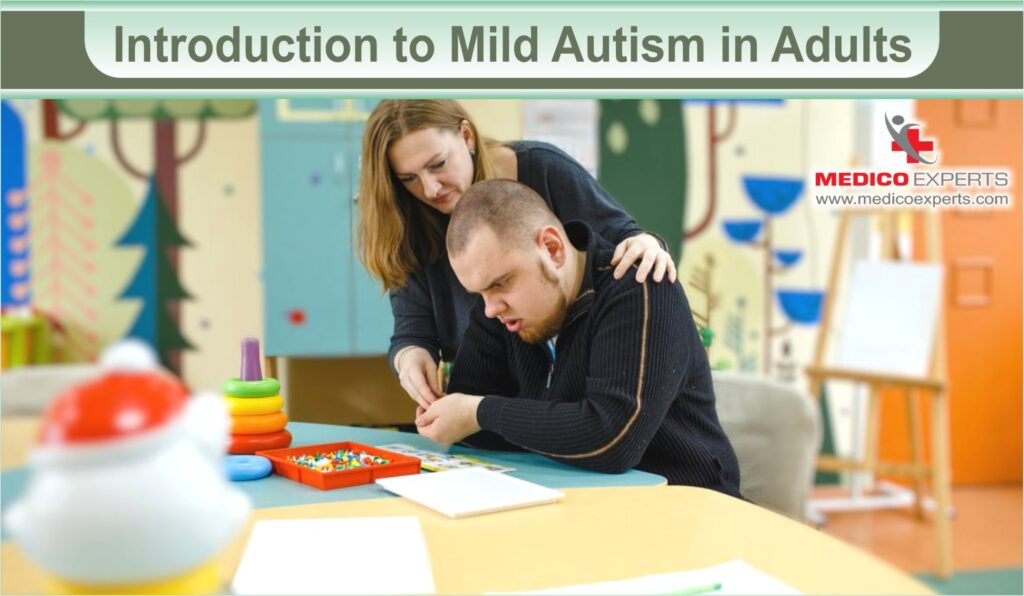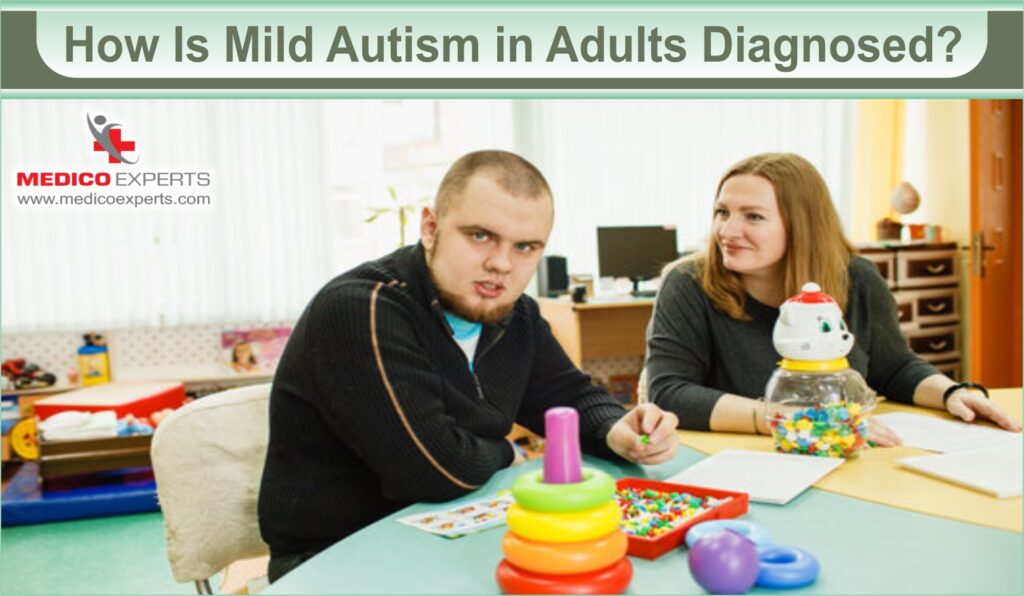Life with mild autism in adulthood is a journey filled with triumphs, challenges, and an unbreakable spirit.
Welcome to a journey of self-discovery and determination.
Step with us into the journey of adults living with mild autism. If you or a loved one is navigating life with mild autism, you’re not alone.
Today’s blog post is dedicated to adults facing autism, helping you better understand the condition and offering valuable insights on how to thrive in your unique journey.
Introduction to Mild Autism in Adults

Autism Spectrum Disorder (ASD) is a complex neurological condition that encompasses a wide range of behaviors, characteristics, and challenges.
While the term “autism” often brings to mind severe cases, it’s essential to recognize that there are varying degrees of ASD, including mild autism.
Mild autism in adults, often referred to as high-functioning autism, is characterized by a range of symptoms that may be less pronounced than those in individuals with severe autism.
People with mild autism can lead fulfilling lives, build meaningful relationships, and contribute to society in their own unique way.
What Are The Common Signs and Symptoms of Mild Autism in Adults?

Mild autism manifests differently in each individual, but some common traits and characteristics can help identify it.
Some of these signs include:
a. Social Challenges:
Adults with mild autism may have difficulty with social interactions, such as maintaining eye contact, understanding social cues, and engaging in small talk. This can sometimes lead to feelings of social anxiety.
b. Repetitive Behaviors:
Like those with more severe forms of autism, individuals with mild autism may engage in repetitive behaviors, such as hand-flapping or obsessive interests in specific topics.
c. Sensory Sensitivities:
Many adults with mild autism have heightened sensitivity to sensory stimuli, like bright lights, loud sounds, or certain textures. These sensitivities can be exhausting and result in sensory overload.
d. Difficulty with Transitions:
Changes in routine or unexpected situations can be challenging for individuals with mild autism, as they often prefer predictability and structure in their daily lives.
e. Strong Focus on Specific Interests:
People with mild autism may have a deep passion or expertise in a particular subject or hobby, to which they may dedicate a significant amount of time and energy.
f. Communication Differences:
While many adults with mild autism have excellent verbal communication skills, they may struggle with understanding non-literal language, humor, or sarcasm.
Remember that these signs and symptoms are not uniform for everyone with mild autism, and the spectrum is incredibly diverse. It’s crucial to approach each person as an individual with unique strengths and challenges.
Additionally, Mild autism in adults often goes undiagnosed, and many individuals lead their lives without knowing they have this unique perspective on the world.
Let us see them in more detail.
What are the Undiagnosed Mild Autism Challenges Adults Face?

Undiagnosed mild autism can present its own set of challenges and opportunities. In this section, we’ll explore the nuances of undiagnosed mild autism and how to recognize it.
The Hidden Spectrum
Mild autism, or high-functioning autism, can sometimes be challenging to identify. Its symptoms are often less pronounced than those in more severe cases.
Many adults with mild autism have developed coping mechanisms and adapted to social expectations, making them harder to spot.
Here are some signs that might suggest undiagnosed mild autism in adults:
Masking:
Some individuals with mild autism become experts at “masking” their differences by mimicking social behavior and masking their true selves to fit in.
Social Exhaustion:
Behind closed doors, they might experience social exhaustion and sensory overload, which they hide from the outside world.
Intense Focus:
Their intense focus on specific interests may be seen as hobbies or passions rather than a hallmark of autism.
Routines and Rituals:
They may maintain strict routines and rituals in their daily lives but dismiss these as abnormalities.
Anxiety and Depression:
Undiagnosed mild autism can lead to anxiety and depression, as individuals may feel isolated and misunderstood.
How Is Mild Autism in Adults Diagnosed?

Receiving a diagnosis of mild autism as an adult can be life-changing.
It offers validation, understanding, and access to appropriate support. If you suspect you may have mild autism or are concerned about a loved one, here’s how the diagnostic process typically works:
1. Self-reflection and Observation
The first step in diagnosing mild autism in adults often involves self-reflection and observation.
You or the individual in question may recognize patterns of behavior, social challenges, and sensory sensitivities. Maintaining a Journal can be a helpful tool for recording thoughts and experiences.
2. Seeking Professional Evaluation
A formal diagnosis requires the expertise of a qualified professional, such as a clinical psychologist, psychiatrist, or developmental pediatrician.
They will carry out an in-depth analysis, which may involve the following:
- Clinical Interviews: The clinician will ask questions about your childhood, social experiences, sensory sensitivities, and any repetitive behaviors.
- Observation: They may observe your behavior in various social and non-social situations to assess social communication skills.
- Questionnaires: You may be asked to complete questionnaires designed to measure autism-related traits and symptoms.
3. Collaborative Approach
In some cases, a collaborative approach involving multiple professionals may be necessary to arrive at an accurate diagnosis.
This can include input from speech therapists, occupational therapists, and other specialists.
4. Support from Loved Ones
The support of loved ones can be instrumental in the diagnostic process.
Their insights and observations can provide additional perspective for the clinician. Open and honest communication is essential.
What Are the Treatment Options for Adults With Mild Autism?

A diagnosis of mild autism in adults is just the beginning of a journey toward self-discovery and personal growth.
With the right support and treatment, individuals can learn to thrive and embrace their unique perspectives.
Here’s an overview of the mild autism treatment in India and support options available:
a. Therapy and counseling:
Engaging in therapy with professionals experienced in autism can provide valuable tools for managing symptoms and improving social and communication skills.
Anxiety and sadness can be alleviated by cognitive-behavioral therapy (CBT).
b. Occupational therapy:
Occupational therapists can assist with sensory sensitivities and help develop strategies for managing daily life.
c. Speech therapy:
Speech therapists can work with individuals to enhance communication and address challenges related to non-literal language and social interactions.
d. Medication:
In some cases, medication may be recommended to manage co-occurring conditions like anxiety, depression, or attention deficit hyperactivity disorder (ADHD).
Medication decisions should be made in consultation with a medical expert.
e. Social Support:
Support Groups: Joining a support group for adults with mild autism can provide a sense of community and a platform for sharing experiences, challenges, and successes.
Friends and family: Open and honest communication with loved ones can strengthen your support network. Educating them about your specific needs and challenges is crucial.
f. Learning Self-Advocacy:
Understanding your unique needs and advocating for yourself is a crucial skill in managing mild autism as an adult.
This includes communicating your needs to employers, seeking accommodations, and taking charge of your well-being.
g. Building a Fulfilling Life:
Above all, remember that a diagnosis of mild autism doesn’t limit your potential. It opens doors to a deeper understanding of yourself and an opportunity to thrive in your unique way.
Continue to pursue your passions, build meaningful relationships, and embrace your individuality.
Seeking professional support and guidance is essential, but so is your resilience and determination. With the right combination of support, self-advocacy, and self-acceptance, you can lead a fulfilling life with mild autism.
Conclusion
Mild autism in adults is not a limitation but a unique perspective on the world. Embrace your interests, your strengths, and your individuality. Seek the support and guidance you need to thrive in daily life and don’t hesitate to reach out to others who share your journey.
You are not alone, and there’s a wealth of resources available to help you navigate the path ahead.
MedicoExperts, a “Global Virtual Hospital,” is one such resource that offers quality healthcare services at affordable prices. We understand the importance of individualized care and support.
We have a network of highly experienced super-specialist doctors and well-equipped hospitals across the globe. We provide second opinions through online video consultations and offer surgical interventions through their impaneled super-specialist doctors in 17 countries from 3 continents.
We hope this blog post has shed light on the world of mild autism in adults and provided you with valuable insights and strategies to lead a fulfilling life.
We invite you to leave your comments and share your experiences, questions, or thoughts. Your input is valuable, and together, we can create a supportive and understanding community for adults facing autism.
FAQ :
Q1. Can adults with mild autism lead fulfilling lives?
A. Absolutely! With the right support, understanding, and self-advocacy, adults with mild autism can lead fulfilling lives. Many individuals with mild autism have deep passions and unique perspectives that can contribute positively to society. Embracing your interests, building meaningful relationships, and seeking appropriate support are key to thriving.
Q2. Is mild autism the same as Asperger’s syndrome?
A. Asperger’s syndrome used to be a separate diagnosis but was folded into the broader category of autism spectrum disorder (ASD) in the Diagnostic and Statistical Manual of Mental Disorders (DSM-5). So, individuals who would have previously received an Asperger’s diagnosis are now typically considered to be on the autism spectrum, including those with mild autism.
Q3. Can mild autism be ‘outgrown’ or cured in adulthood?a
A. Autism is a lifelong condition, and there is no cure for it. However, with appropriate therapy, support, and self-management strategies, adults with mild autism can learn to manage their symptoms effectively and lead fulfilling lives. The goal is not to eliminate autism but to provide the tools and support to thrive with it.
Q4. Can adults with mild autism have successful careers and relationships?
A. Yes, adults with mild autism can have successful careers and meaningful relationships. Many individuals with mild autism excel in their chosen fields due to their intense focus and expertise in specific areas. Building and maintaining relationships may require some effort, but with social skills training and understanding partners, fulfilling relationships is entirely possible.
Q5. What role can therapy play in the treatment of mild autism in adults?
A. Therapy, including counseling, occupational therapy, and speech therapy, can play a significant role in the treatment of mild autism in adults. These therapeutic interventions can help individuals develop better social and communication skills, manage anxiety and sensory sensitivities, and enhance their overall well-being. MedicoExperts can assist in connecting you with qualified specialists who provide these therapies.



